22+ Sample Internship Scope of Work
-
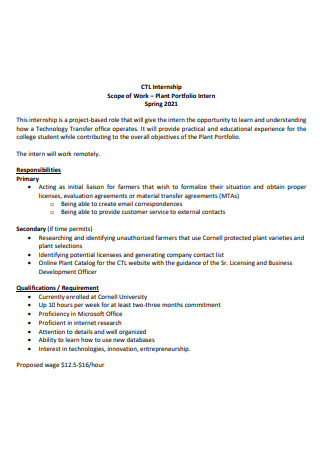
Internship Scope of Work Template
download now -
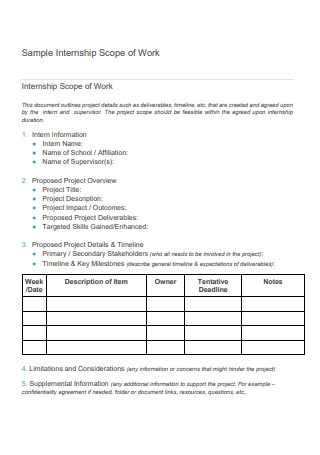
Sample Internship Scope of Work
download now -
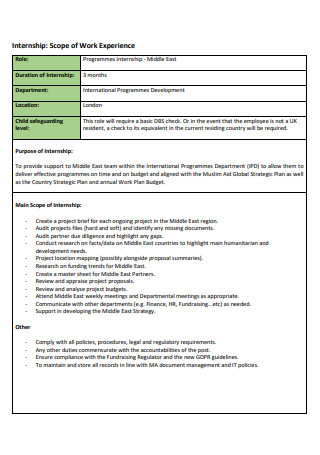
Internship Scope of Work Experience
download now -
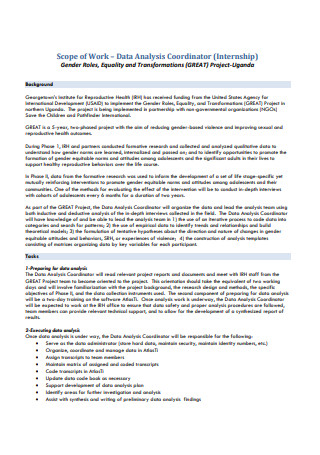
Coordinator Internship Scope of Work
download now -
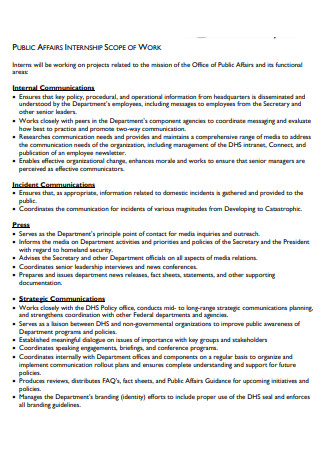
Public Affairs Internship Scope of Work
download now -

Graduate Student Internship Scope of Work
download now -
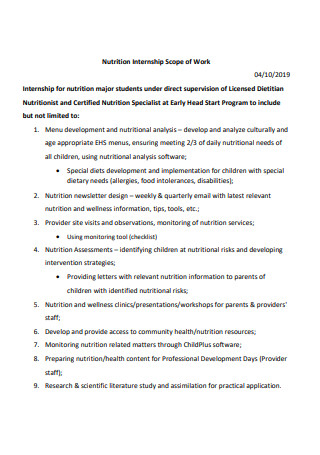
Nutrition Internship Scope of Work
download now -
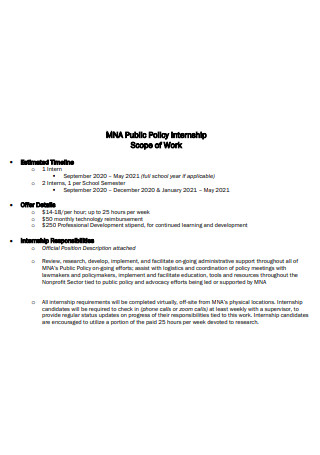
Public Policy Internship Scope of Work
download now -
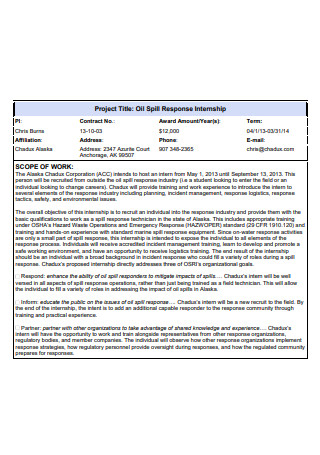
Response Internship Scope of Work
download now -
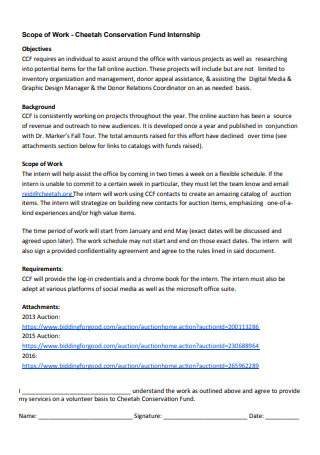
Conservation Fund Internship Scope of Work
download now -
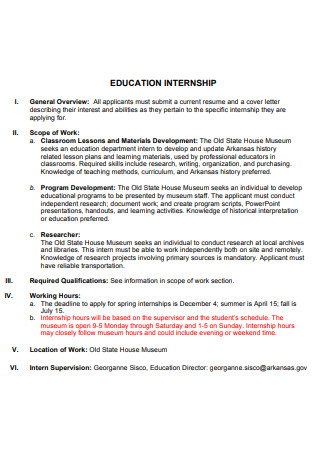
Education Internship Scope of Work
download now -
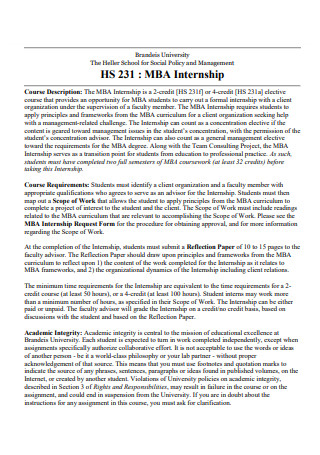
MBA Internship Scope of Work
download now -
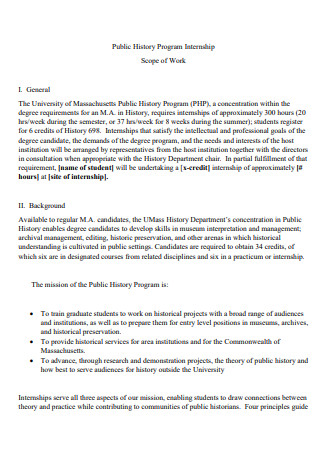
Public Program Internship Scope of Work
download now -
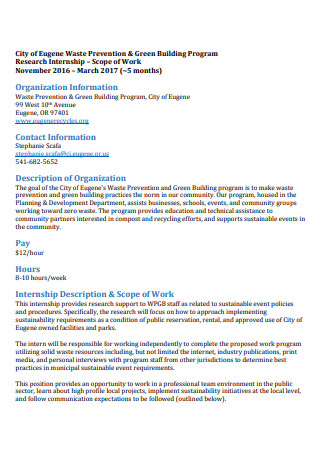
Internship Scope of Work in PDF
download now -
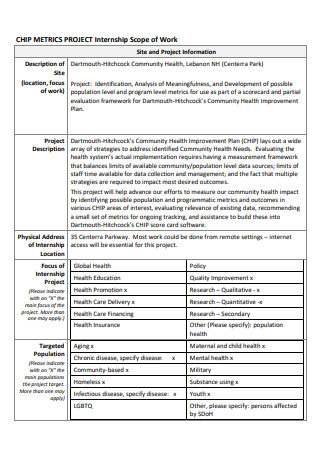
Project Internship Scope of Work
download now -
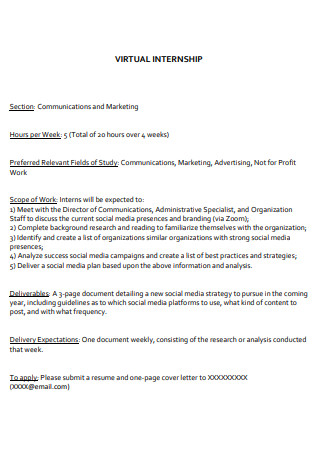
Virtual Internship Scope of Work
download now -
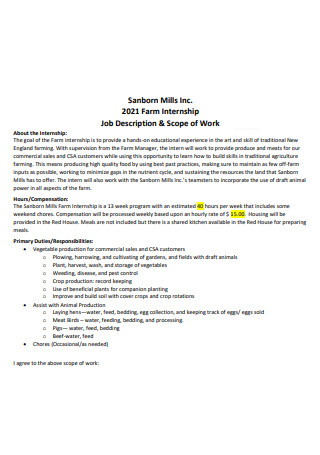
Farm Internship Job Description and Scope of Work
download now -
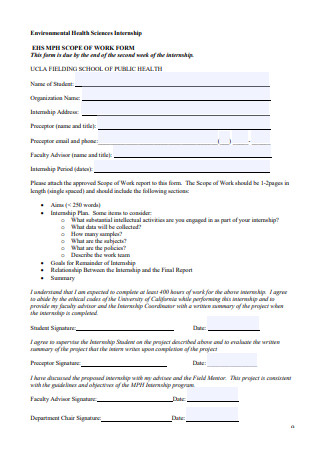
Internship Scope of Work Form
download now -

Internship Scope of Work Example
download now -
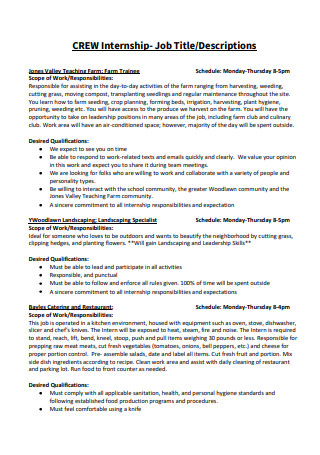
Printable Internship Scope of Work
download now -
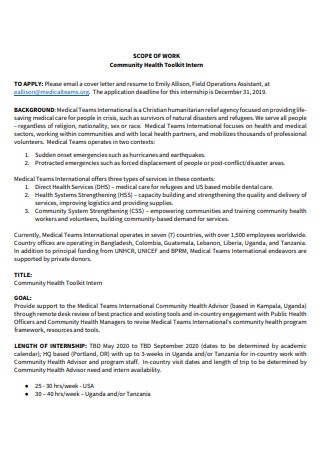
Community Health Internship Scope of Work
download now -
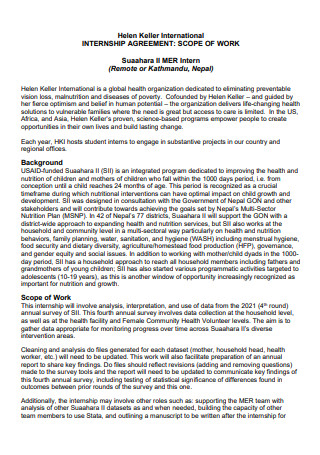
Internship Agreement Scope of Work
download now -

Internship Scope of Work in DOC
download now
What Is an Internship Scope of Work?
Numerous internships ask you to work on a project, supervise a small team, and cooperate with executives. The scope of work for an internship describes the project information provided and agreed upon by the intern and supervisor, such as deliverables, schedule, etc. The project’s scope should be feasible during the internship’s duration. Its objective is to guarantee that expectations are clear and mutually agreed upon and that you and the people you collaborate with know their responsibilities. It should be there whenever a job is decided upon. Still, it becomes increasingly crucial as the work complexity, difficulty in physically expressing the deliverables, or time required to perform tasks rises. It enables members to share the same vision. According to statistics, students who had an internship are 15% less likely to be unemployed in their first years after graduation.
Benefits of Internships
Internships can help you get valuable work experience, satisfy academic requirements, and add to your resume. They can introduce you to various areas of a full-time job while allowing you to explore your interests and develop your career objectives. Consider, when you complete your undergraduate education and embark on your chosen career path, how an internship may help you check your focus and prepare you for future employment. The following are some benefits of apprenticeships for students:
Types of Internships
If you’re considering creating an internship plan or program at your organization, you may be curious about the differences between the various sorts of internships. Here is a brief and straightforward guide to assist you in navigating the many alternatives available to you as the host of an internship program, as well as how each form of internship can benefit you and the student or recent graduate you hire.
1. Paid Internships
Paid internships are most common in the private sector or large companies with the money to pay students while they work and learn. If you can choose between a paid internship and an unpaid internship, you should choose the paid internship. More and more companies realize how essential internship programs are and how much they help with hiring. As these communities work to train interns, they also look at them from every angle to see how good they might be as full-time employees in the future.
2. Internships for College Credit
To be considered “credit-worthy” for internship credit, the experience must be strongly tied to an academic discipline. The first concern is establishing the usefulness of the internship experience within the context of higher education. As the creator of the internship program, you can investigate this to determine if your program meets credit criteria. If so, your program may be a more attractive alternative for prospective recruits.
3. Summer Internships
Internships over the summer typically last between eight and twelve weeks and can be either full- or part-time. These short-term experiences provide a genuine understanding of what it’s like to work in a specific job or career field. There is adequate time to establish a regular work pattern and acquire valuable skills and information. Summer internships may or may not be done for academic credit. Obtaining credit during the summer might be advantageous because it reduces a student’s course load during the fall and spring semesters; however, most colleges require students to pay tuition to obtain credit.
4. Nonprofit Internships
If your organization is a nonprofit, the internship is typically somewhat different from that of a for-profit business. The organization’s primary focus is on providing a service with no owners to share in the organization’s annual earnings or losses. As would be expected, interns at nonprofit organizations are typically unpaid. However, employers seeking entry-level employees in this industry require interns to possess several unique abilities. These talents can be gained through internships with charitable organizations.
5. Externships
Externships, often shorter than internships, is another possibility for your organization. Apprenticeships provide students with brief experiential learning opportunities, usually from one day to a few weeks. Externships are frequently referred to as job shadowing since they allow students to obtain insight and expertise in a career field of interest by deciding whether the daily activities and responsibilities of the work are a good match for their talents and interests.
How to Find an Internship
You have the best chance of obtaining the ideal internship if you apply many approaches. Networking, attending career fairs, searching for internship listings online, and identifying possible companies through classified advertisements or an online search are all excellent ways to begin your internship hunt. Finding an apprenticeship takes time and work, but the returns are well worth the investment. Here are some suggestions for people in search of practical training.
1. Commence Your Search Early
Be aware that several businesses and internships have early application deadlines and begin hiring and recruiting candidates as early as November. Starting your internship hunt during the holiday season saves you considerable lead time. Before returning to school, you may also have the opportunity to develop valuable relationships with alumni or professionals inside organizations of interest. Check with the Career Services Office of your college for assistance and to learn which internships recruit early.
2. Determine Your Diverse Career Interests
Determine what you wish to do, but avoid being overly explicit. If you are unclear about the career you want to follow after graduation, it is an excellent idea to gain experience in a variety of fields. Consider your interests and how they might translate into a job. Do you prefer viewing financial and investment-related programs? Home improvement? History? Are you interested in social activism and improving the world? Internships can provide exposure to opportunities and the ability to explore fascinating new career sectors.
3. Network
Speak with family, friends, instructors, college advisers, and career counselors in your college’s Career Services Office about the type and location of internship you desire. Contacting alumni from your college and conducting informational interviews can give you vital insight into potential careers and internships. Be sure to write them a note of gratitude for sharing their time and knowledge.
4. Attend Job Fairs
Check with your college’s office for information about career and internship fairs over winter break. Employers of distinction visit career fairs to seek, screen, and hire outstanding interns and workers. Prepare a 60-second introduction that describes your value to a prospective employer. Follow up with every recruiter you meet at a job fair.
5. Contact Employers
Employers in your geography and career areas of interest should be contacted by phone or in-person to ask about summer jobs and internships. Prepare a 60-second introduction that promotes your talents and shows how you can add value. Focus on potential summer jobs and, if interested, seek chances at camps or resorts to enhance interpersonal and communication skills. Additionally, temp agencies supply information regarding the job needs of local employers. Always follow up with potential employers to schedule an in-person or telephone interview.
6. Start Your Own Business and Get Experience If You Just Graduated
Do you possess unique abilities or a method for solving a market need? Also, new graduates and those through a career shift can utilize internships to get insight into new professional fields and acquire new abilities. Internships can be a stepping stone between unpleasant employment and a possibly more fulfilling endeavor. You can locate organizations that fit your requirements using training and job search databases.
FAQs
What do internship students do?
An intern or trainee can perform for an organization in the modern world for a set amount of time. Depending on the company and the industry, interns can work anywhere from one to twelve months or even longer. Graduate and undergraduate students who want to research or gain valuable work experience often do internships.
What is paid internship?
Paid internships give students a chance to learn about a career field and get the skills they need to be successful in it while making some money through an hourly wage, a weekly salary, or a stipend for the internship.
Is it hard to get an internship?
Landing an internship is not as difficult as you may expect, and getting your dream internship is far more possible than you believe. You need to track a few basic steps, and you’ll soon have the ultimate college internship.
Work scope is a valuable tool for keeping everyone accountable and on track. There may appear to be a substantial amount of work up front, but the more you can clarify, the more accessible the remainder of the project will be. Using our free, pre-made, and editable Internship Scope of Work document samples will improve the success of your company’s internship program. Check out these additional examples for more internship application guidance.
